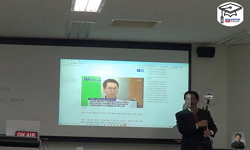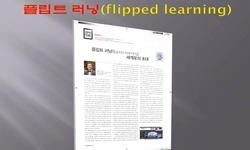The purpose of this study is to examine the students`` preference and failure tolerance applying the flipped learning to English class. To achieve this goal, the flipped class was designed considering educational prerequisites and analyses drawn from ...
http://chineseinput.net/에서 pinyin(병음)방식으로 중국어를 변환할 수 있습니다.
변환된 중국어를 복사하여 사용하시면 됩니다.
- 中文 을 입력하시려면 zhongwen을 입력하시고 space를누르시면됩니다.
- 北京 을 입력하시려면 beijing을 입력하시고 space를 누르시면 됩니다.

대학 영어수업에서 거꾸로 학습(Flipped Learning) 적용 사례실패내성과 선호도 중심으로 = A Case Study of Flipped Learning at College English: Focused on Failure Tolerance and Preference
한글로보기https://www.riss.kr/link?id=A101074535
- 저자
- 발행기관
- 학술지명
- 권호사항
-
발행연도
2015
-
작성언어
Korean
- 주제어
-
등재정보
KCI등재
-
자료형태
학술저널
-
수록면
289-316(28쪽)
-
KCI 피인용횟수
35
- DOI식별코드
- 제공처
- 소장기관
-
0
상세조회 -
0
다운로드
부가정보
다국어 초록 (Multilingual Abstract)
The purpose of this study is to examine the students`` preference and failure tolerance applying the flipped learning to English class. To achieve this goal, the flipped class was designed considering educational prerequisites and analyses drawn from literature reviews and case studies. 10 students majoring in English participated in the research for 8 weeks. For the first 4 weeks, teacher-oriented class was performed. For the other 4 weeks, flipped learning was implemented. Before the research, academic failure tolerance scale was measured. After the 8th class, academic failure tolerance scale was investigated again. Furthermore, qualitative data were explored in order to have a better understanding of the students`` preference and awareness of the flipped learning. The results of this study are that first, the mean score of failure tolerance showed a significant difference between before and after the flipped learning. Among the 3 subcategories, behavior scale and emotion scale have a significant difference. Secondly, 7 of the 10 students chose the flipped learning for the next semester, the other 3 students want to have a class mixed a teacher-oriented class with collaborative learning and want to have a teacher-oriented class instead of on-line lecture. The students stated that the good points of the flipped learning are voluntary involvement and interaction and bad points are burden on pre-study and free-riding of students who are not prepared for the class. For the further study, the flipped learning should be applied to other classes which students have low failuretolerance. Considering that failure tolerance scale has an effect on expecting better academic achievement, flipped learning can lead an improvement of academic achievement on subjects students have low failure tolerance. The results of this study implicate that applying flipped learning to a subject which students have low failure tolerance can raise failure tolerance changing negative experience to positive.
참고문헌 (Reference)
1 김아영, "한국형 학구적 실패에 대한 내성척도 개발에 관한 연구" 32 (32): 59-75, 1994
2 길형석, "학습자중심교육에서의 교수원리 연구" 1 (1): 1-30, 2001
3 주지은, "학습자의 동기적 특성과 학업 성취간의 관계 : 학습된 무기력과 실패내성을 중심으로" 이화여자대학교 교육대학원 1999
4 이지연, "학습자 중심 플립드러닝(Flipped Learning) 수업의 적용 사례" 한국교육공학회 30 (30): 163-191, 2014
5 김아영, "학구적 실패에 대한 내성의 관련변인 연구" 11 (11): 1-19, 1997
6 엄우용, "플립드 클래스룸이란 무엇인가?" 12 : 28-31, 2014
7 김백희, "플립드 러닝(Flipped Learning)을 기반으로 한역할 교체식 토의 수업 방안 연구" 우리말학회 (37) : 141-166, 2014
8 이동엽, "플립드 러닝(Flipped Learning) 교수학습 설계모형 탐구" 한국디지털정책학회 11 (11): 83-92, 2013
9 김남익, "대학에서의 거꾸로 학습(Flipped learning) 사례 설계 및 효과성 연구: 학습동기와 자아효능감을 중심으로" 한국교육공학회 30 (30): 467-492, 2014
10 한형종, "대학 역전학습 온·오프라인 연계 설계전략에 관한 연구" 한국교육공학회 31 (31): 1-38, 2015
1 김아영, "한국형 학구적 실패에 대한 내성척도 개발에 관한 연구" 32 (32): 59-75, 1994
2 길형석, "학습자중심교육에서의 교수원리 연구" 1 (1): 1-30, 2001
3 주지은, "학습자의 동기적 특성과 학업 성취간의 관계 : 학습된 무기력과 실패내성을 중심으로" 이화여자대학교 교육대학원 1999
4 이지연, "학습자 중심 플립드러닝(Flipped Learning) 수업의 적용 사례" 한국교육공학회 30 (30): 163-191, 2014
5 김아영, "학구적 실패에 대한 내성의 관련변인 연구" 11 (11): 1-19, 1997
6 엄우용, "플립드 클래스룸이란 무엇인가?" 12 : 28-31, 2014
7 김백희, "플립드 러닝(Flipped Learning)을 기반으로 한역할 교체식 토의 수업 방안 연구" 우리말학회 (37) : 141-166, 2014
8 이동엽, "플립드 러닝(Flipped Learning) 교수학습 설계모형 탐구" 한국디지털정책학회 11 (11): 83-92, 2013
9 김남익, "대학에서의 거꾸로 학습(Flipped learning) 사례 설계 및 효과성 연구: 학습동기와 자아효능감을 중심으로" 한국교육공학회 30 (30): 467-492, 2014
10 한형종, "대학 역전학습 온·오프라인 연계 설계전략에 관한 연구" 한국교육공학회 31 (31): 1-38, 2015
11 김보경, "교직수업을 위한 역진행 수업모형 개발" 교육종합연구소 12 (12): 25-56, 2014
12 이정표, "교육적 소통을 통한 학습자 중심 수업의 본질 논의" 학습자중심교과교육학회 12 (12): 643-661, 2012
13 이민경, "거꾸로 교실(Flipped classroom)의 교실사회학적 의미 분석: 참여 교사들의 경험을 중심으로" 한국교육사회학회 24 (24): 181-207, 2014
14 박태정, "거꾸로 교실(Flipped Classroom)의 교육적 활용가능성 탐색을 위한 교사 인식 조사" 한국컴퓨터교육학회 18 (18): 81-97, 2015
15 신정숙, "발표·토론 동영상을 활용한 ‘거꾸로’ 교수법의 교육 효과 사례 분석 ― 조선대학교 <사고와 표현1> 수강 학생을 중심으로" 한국교양교육학회 8 (8): 133-163, 2014
16 임진혁, "e-Education을 통한 대학교육 혁신" 30 (30): 48-55, 2012
17 Gannod, G., "Using the inverted classroom to teach software engineering" ACM 777-786, 2008
18 Clifford, M., "Thoughts on a theory of constructive failure" 19 (19): 108-120, 1984
19 Bishop, J. L., "The flipped Classroom: A survey of the Research" 33-43, 2013
20 Butt, A., "Students views on the use of a flipped classroom approach : Evidence from Australia" 6 (6): 33-43, 2014
21 Enfield, J., "Looking at the impact of the flipped classroom model of instruction on undergraduate multimedia students at CSUN" 5 (5): 14-27, 2013
22 Berrett, D., "How ‘flipping' the classroom can improve the traditional lecture" 58 (58): 16-18, 2012
23 Strayer, J. F., "How learning in an inverted classroom influences cooperation, innovation, and task orientation" 15 : 171-193, 2012
24 Davies, R. S., "Flipping the classroom and instructional technology integration in a college-level information systems spreadsheet course" 61 : 563-583, 2013
25 이종연, "Flipped learning의 의의 및 교육환경에 관한 탐색적 연구" 한국디지털정책학회 12 (12): 313-323, 2014
26 November A., "Flipped learning: A response to five common criticisms"
27 Frydenberg, M., "Flipped excel" 11 (11): 63-73, 2013
28 정 민, "Flipped Classroom 학습이 초등학생의 수학과 학업성취도와 태도에 미치는 영향" 한국교원대학교 대학원 2014
29 Bergmann, J., "Flip your classroom : Research every student in every class every day" ISTE 2012
30 Ash, K., "Educators evaluate ‘Flipped Classrooms' : Benefits and drawbacks seen in replacing lectures with on-demand video" 32 (32): 6-8, 2012
31 Herreid, C. F., "Case studies and the flipped classroom" 42 (42): 62-66, 2013
32 Hamdan, N., "A review of flipped learning"
33 Fulton, K. P., "10 Reasons to flip" 94 (94): 20-24, 2012
동일학술지(권/호) 다른 논문
-
영어 글쓰기 정확도 향상을 위한 교사의 오류수정 피드백 유형에 관한 연구
- 21세기영어영문학회
- 양소영 ( Soyoung Yang )
- 2015
- KCI등재
-
- 21세기영어영문학회
- 유도형 ( Dohyung Ryu )
- 2015
- KCI등재
-
고등학생을 대상으로 한 학습 성찰일지 작성이 영어쓰기 능력에 미치는 영향 탐구
- 21세기영어영문학회
- 이태경 ( Taekyung Lee )
- 2015
- KCI등재
-
『디도, 카르타고의 여왕』 과 엘리자베스 시대의 정치적 욕망
- 21세기영어영문학회
- 강석주 ( Seokchu Kang )
- 2015
- KCI등재
분석정보
인용정보 인용지수 설명보기
학술지 이력
| 연월일 | 이력구분 | 이력상세 | 등재구분 |
|---|---|---|---|
| 2024 | 평가예정 | 재인증평가 신청대상 (재인증) | |
| 2021-01-01 | 평가 | 등재학술지 선정 (계속평가) |  |
| 2020-12-01 | 평가 | 등재후보로 하락 (재인증) |  |
| 2017-01-01 | 평가 | 등재학술지 유지 (계속평가) |  |
| 2013-01-01 | 평가 | 등재학술지 유지 (등재유지) |  |
| 2010-01-01 | 평가 | 등재학술지 선정 (등재후보2차) |  |
| 2009-01-01 | 평가 | 등재후보 1차 PASS (등재후보1차) |  |
| 2007-01-01 | 평가 | 등재후보학술지 선정 (신규평가) |  |
| 2005-06-29 | 학회명변경 | 한글명 : 21영어영문학회 -> 21세기영어영문학회 |
학술지 인용정보
| 기준연도 | WOS-KCI 통합IF(2년) | KCIF(2년) | KCIF(3년) |
|---|---|---|---|
| 2016 | 0.25 | 0.25 | 0.25 |
| KCIF(4년) | KCIF(5년) | 중심성지수(3년) | 즉시성지수 |
| 0.26 | 0.25 | 0.49 | 0.07 |




 eArticle
eArticle KISS
KISS







